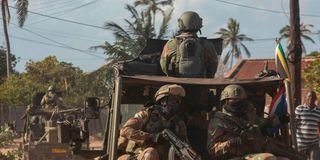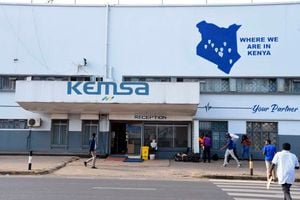Prime
SADC extends Mozambique mission, agrees to deploy troops DR Congo

A military convoy of South Africa National Defence Forces (SANDF) rides along a dirt road in the Maringanha district in Pemba, Mozambique on August 5, 2021.
The Southern Africa Development Community (SADC) leaders on Thursday agreed to deploy troops to the Democratic Republic of Congo, and extended the bloc’s military mission in Mozambique, in a move they said is meant to bring peace to the region.
The resolutions were made after the 43rd Ordinary Summit of SADC Heads of State and Government, the highest organ of the southern African bloc. The decision means member states of the bloc could deploy a new mission to the DRC, making it three the number of foreign military missions in eastern parts of the country where hundreds of armed groups roam. The two others—the United Nations Stabilisation Mission in the Congo (Monusco) and the East African Community Regional Force (EACRF)—have operated controversially, sometimes accused of being lethargic and facing angry civilians in protests.
This week, the UN Secretary General Antonio Guterres announced Monusco will hasten their withdrawal, citing a hostile public opinion about the 15,000-troop mission. Monusco is supposed to leave completely by end of next year, with its withdrawal starting this coming December.
EACRF on its part has its mandate until September this year and could be forced out if Kinshasa refuses to extend the Status of Force Agreement, which is the country permission to allow the troops from the East African Community to deploy. EACRF was deployed in November last year and had its initial agreement extended by six months in March.
SADC’s decision, openly favoured by Kinshasa earlier, means the troops will be deployed as a complement of EACRF, rather than compete for attention.
SADC leaders gathering in the Angolan capital Luanda on Thursday cited the instability in the eastern part of the Democratic Republic of Congo (DRC) and in the insurgency in northern province of Cabo Delgado in Mozambique as issues of global concern. The two countries are members of SADC, but DRC also recently joined the East African Community.
“Summit endorsed the extension of the SADC Mission in Mozambique (SAMIM) by twelve months, and commended Member States, SAMIM Mission Leadership and Personnel for their dedication and contribution in supporting the Mission to achieve peace and security in the Cabo Delgado Province in northern Mozambique and the commencement of a phased drawdown of SAMIM,” the Summit’s communiqué reads.
As for the DRC, “summit also received an update on the security situation in the eastern DRC and endorsed the deployment of the SADC Mission in the DRC (SAMIM) to restore peace and security in the eastern DRC.”
In the DRC, diplomatic efforts as well as consultations and high-level meetings have been held without favourable results. In Mozambique, an insurgency since 2017 has displaced thousands. Violence first erupted in October 2017 when about 30 armed men launched a dawn raid on three police stations in Mocimboa da Praia.
The SADC Mission in Mozambique was first deployed on July 2021, following Rwandan troops who had arrived on scene in a bilateral arrangement with Maputo.
The summit saw the election of Angola President João Lourenço as SADC chairperson who considered the situation in Mozambique more stable but expressed his concern over the instability in the DRC.
“…we have seen that the current situation in Mozambique is considerably calmer and more stable…”
“We will continue to work on finding the best paths to peace in the east of the DRC, in close co-ordination and consultation with the other mechanisms currently in place to resolve this intractable conflict,” President Lourenço told the audience at the end of the summit.
Zambian President Hakainde Hichilema, who was elected as Chairperson of the Organ on Politics, Defence and Security Cooperation, considers local solutions as the answer for the instability in the region.
“We all agree that African challenges are best addressed with African solutions and by Africans themselves, underscoring the importance of increased trade and investment among SADC Member States,” President Hichilema wrote at his Facebook page soon after the summit.
Apart from presidents Lourenço and Hichilema, the summit was also attended by presidents Mokgweetsi Masisi (Botswana), Felix Tshisekedi (DRC) and Lazarus Chakwera of Malawi.
Presidents Filipe Nyusi of Mozambique, Hage Geingob of Namibia, Cyril Ramaphosa of South Africa, Emmerson Mnangagwa of Zimbabwe and Eswatini’s King Mswati III were also in attendance.
Lesotho, Seychelles, Tanzania, Mauritius and Comoros were represented.





